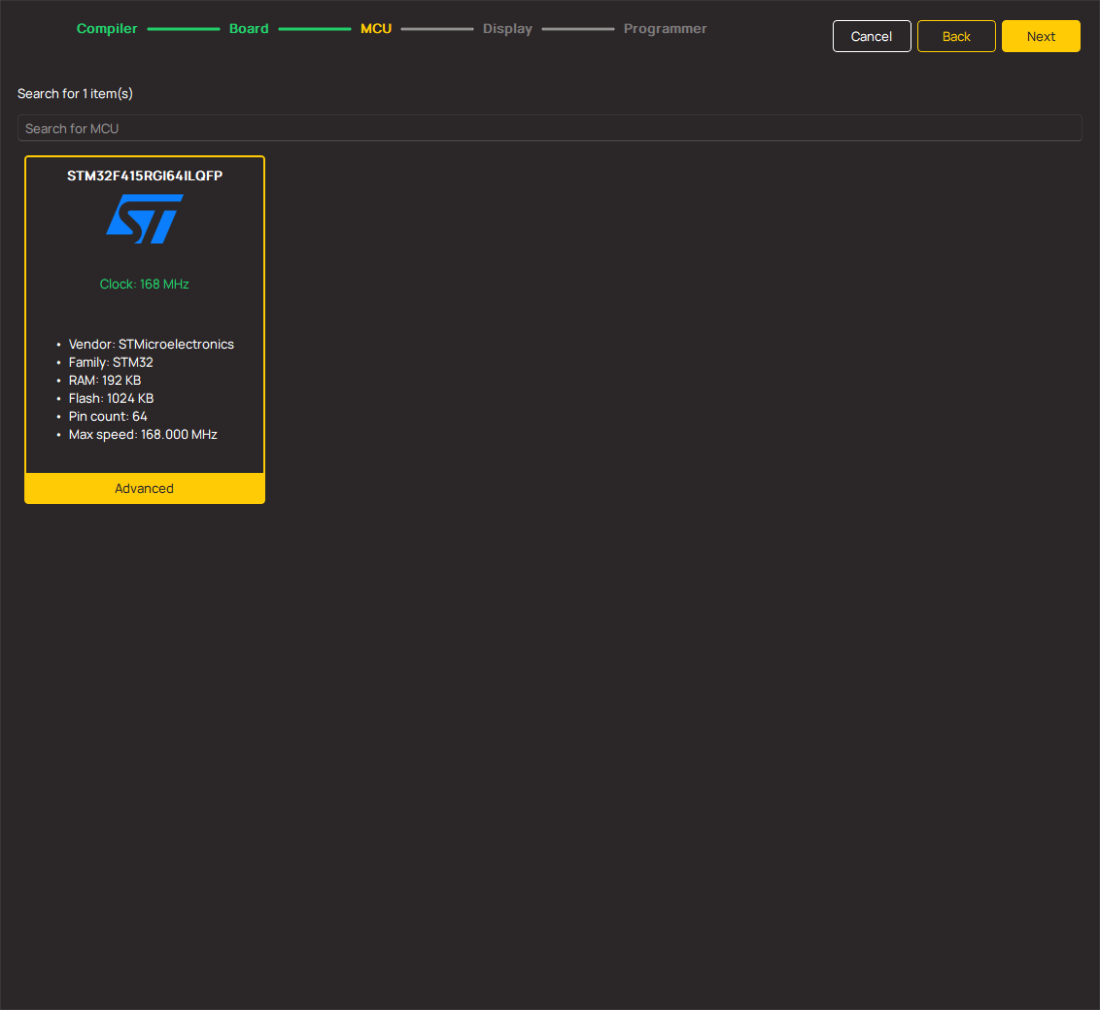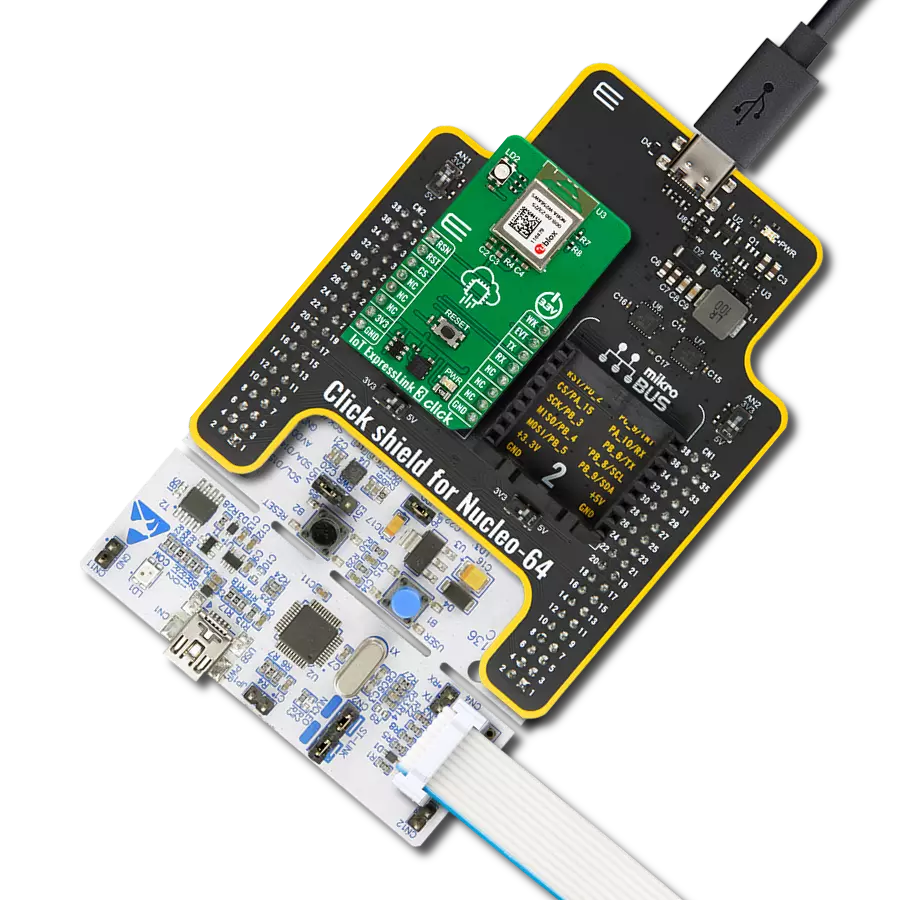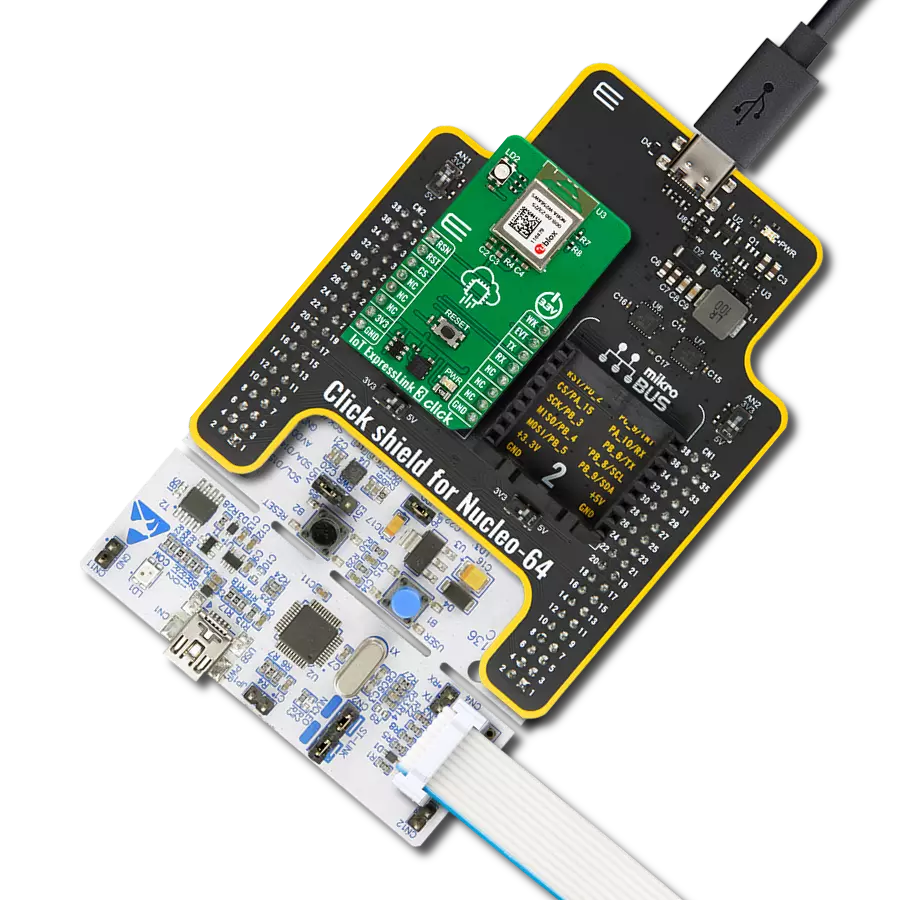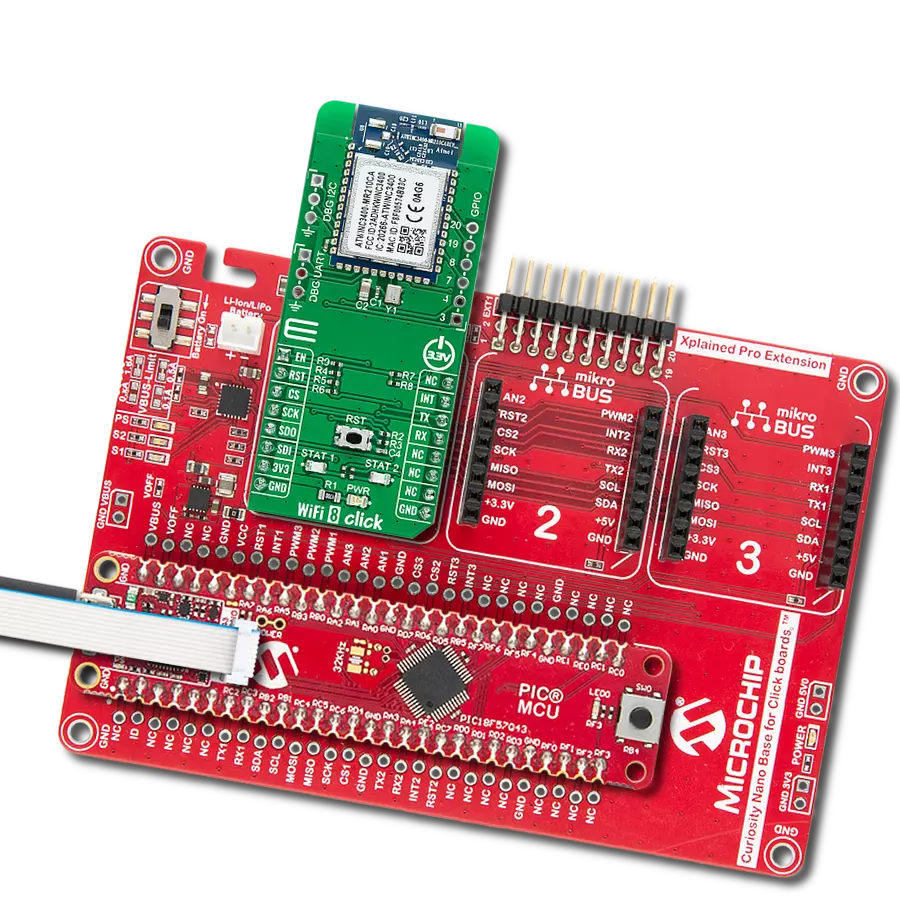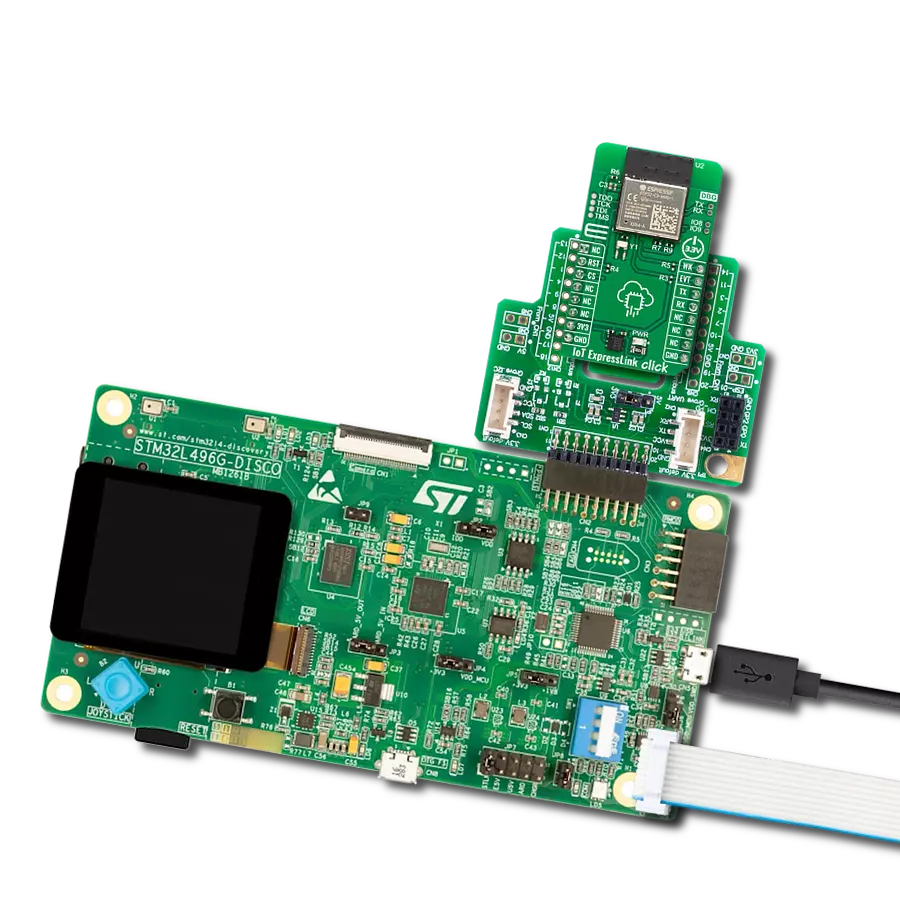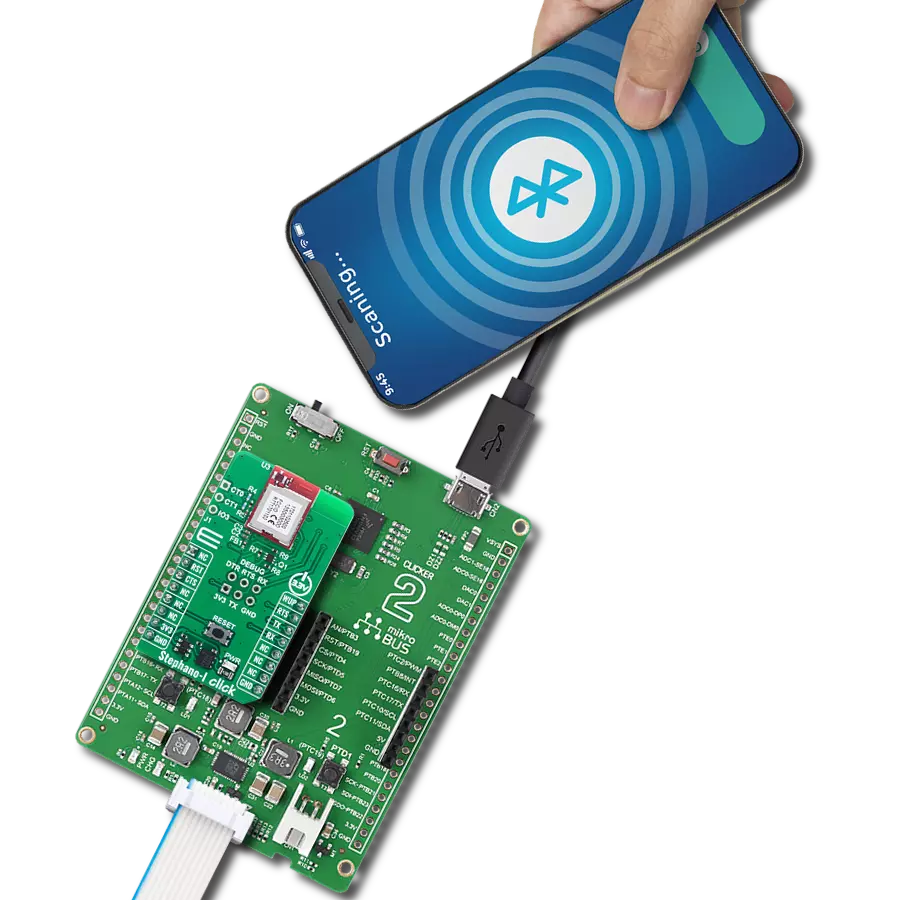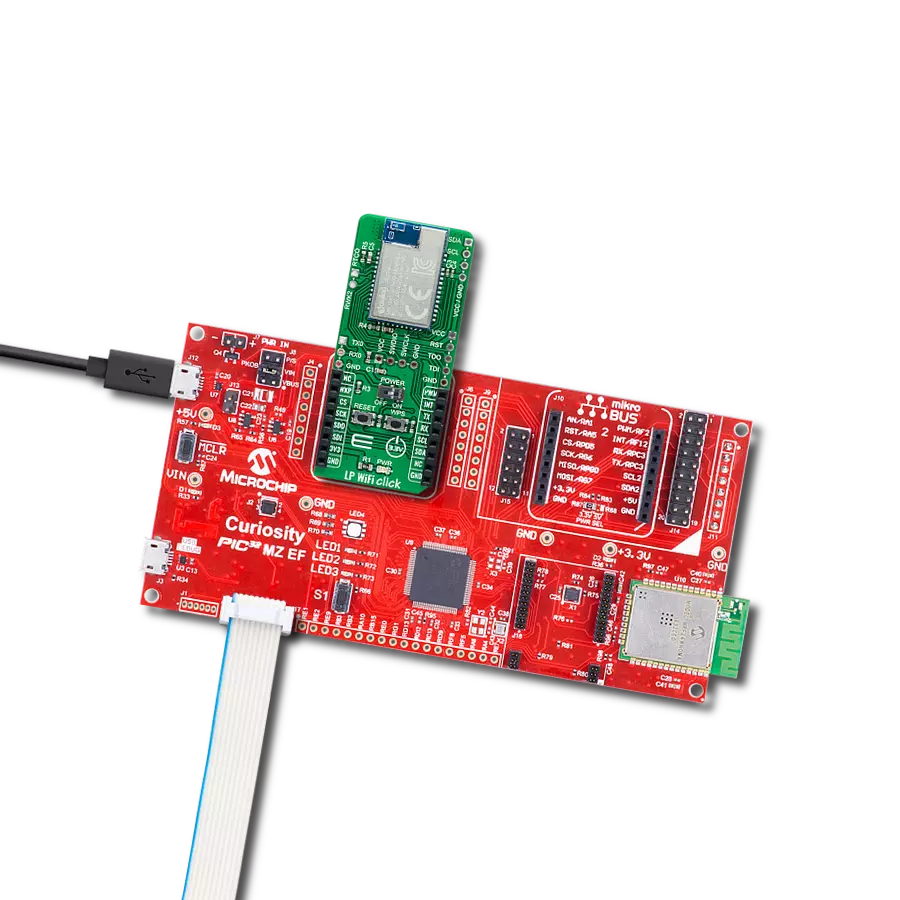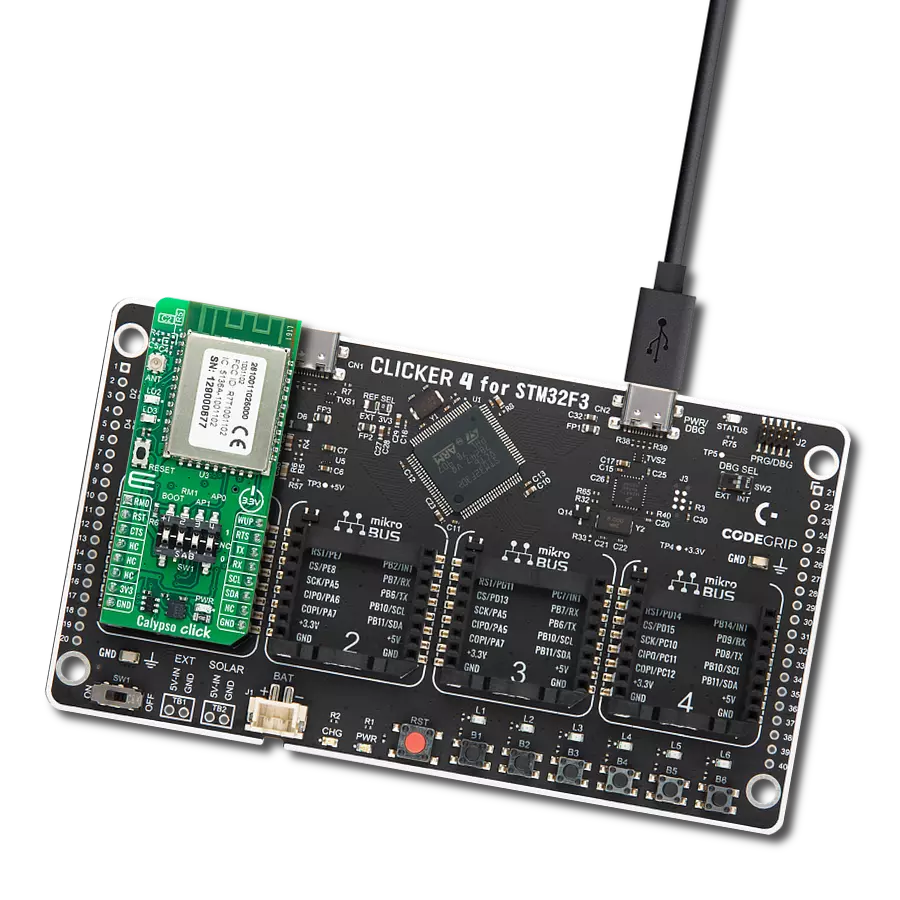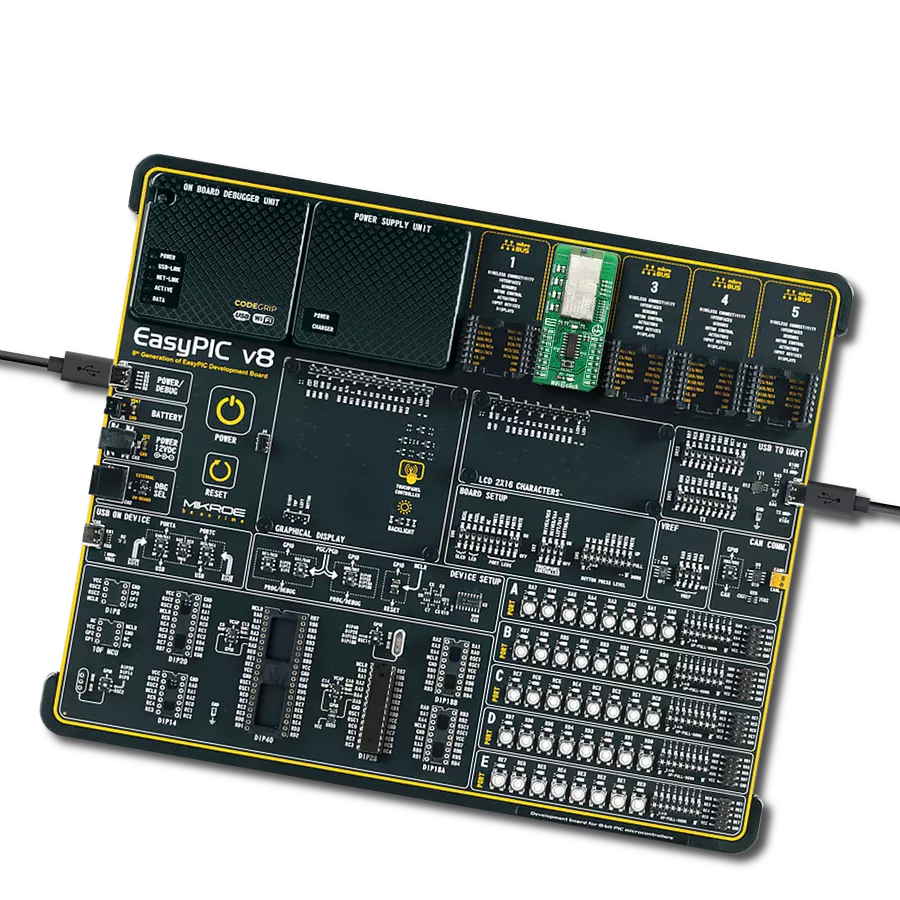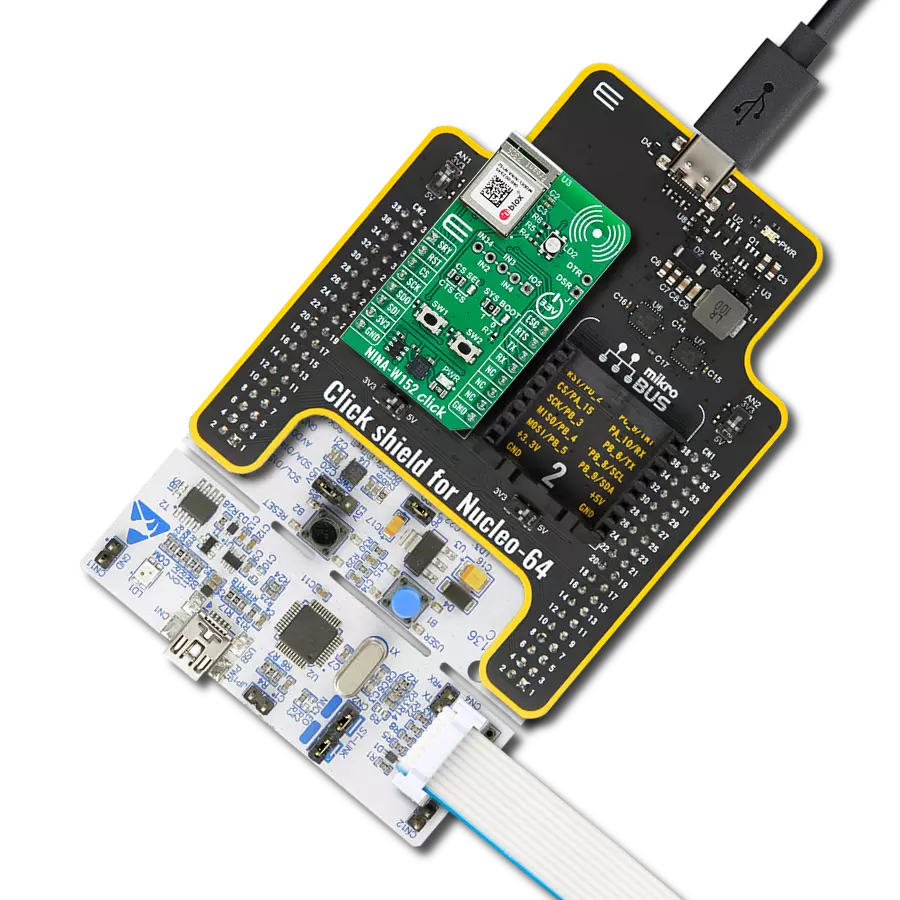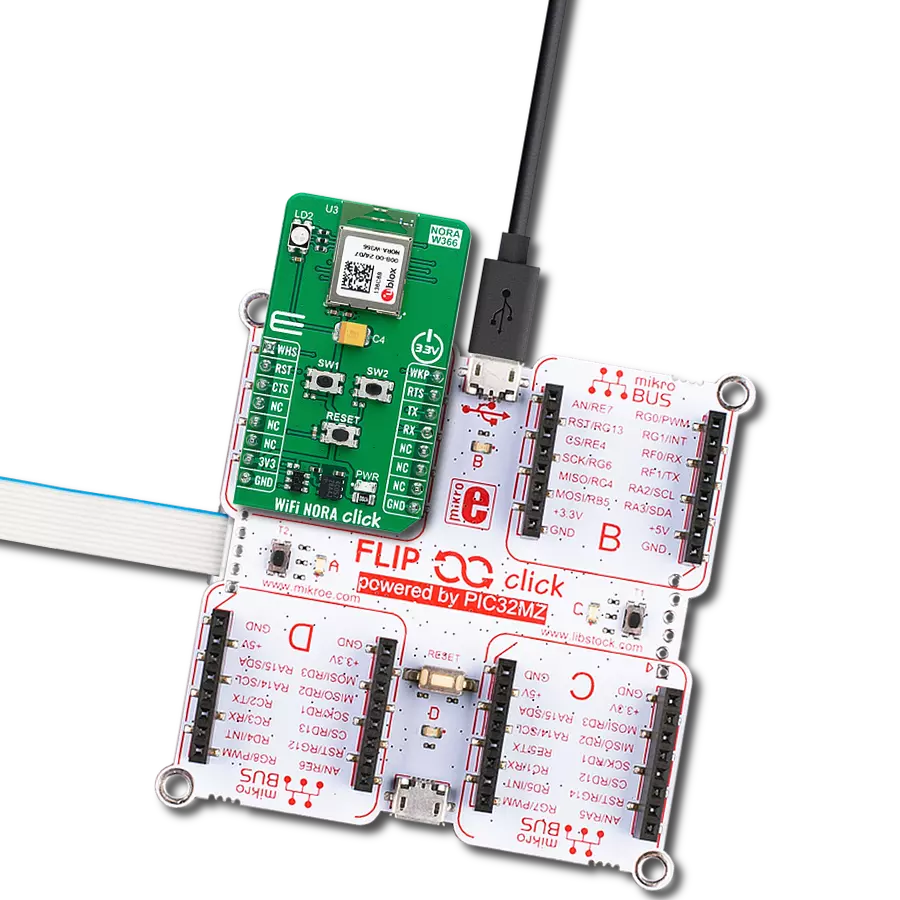通过双频WiFi和BLE连接增强您的项目,实现安全可靠的通信
A
A
硬件概览
它是如何工作的?
WiFi NORA Click基于u-blox的NORA-W366-00B6-00B双频WiFi和低功耗蓝牙(BLE)模块,采用Realtek RTL8720DF芯片,旨在增强专业级应用中的无线连接性。该模块支持WiFi 4(802.11a/b/g/n)协议,在2.4GHz和5GHz频段均可工作,能够作为WiFi站点或接入点运行。此外,它提供了蓝牙v5.3功能,能够作为外围设备、中央设备或两者兼具,并可以灵活充当GATT客户端或服务器。WiFi NORA Click适用于多种应用场景,如工业自动化、智能建筑与家居、智慧城市、计量和公用事业、医疗保健以及电动汽车充电等。该模块通过全球认证,配备了高性能的内部PCB天线,具有广泛的覆盖范围。模块预装了u-connectXpress软件,简化了终端产品的集成,加快了上市时间。它包括用于点对点和点对多点应用的
TCP/IP协议栈,并通过支持TLS加密和MQTT协议,确保与基于云的服务进行安全通信。此外,该模块还提供了强大的安全功能,包括WPA2/WPA3、WiFi企业安全和蓝牙LE安全连接。此Click板™通过UART接口在NORA-W366-00B6-00B模块与主MCU之间建立通信,使用标准的UART RX和TX引脚以及硬件流控制引脚(CTS/RTS)。默认通信速度设定为115200bps,以确保高效的数据交换。主MCU通过高级AT命令配置无线通信和其他功能,免去了深入了解WiFi和蓝牙协议栈的需求。除了接口引脚外,模块还使用了一些其他的mikroBUS™引脚,例如WKP引脚,作为主MCU唤醒功能的输出,WHS引脚用于将模块从深度睡眠模式唤醒。该板还具有一个RST引脚和一个RESET按钮,用于重置模块的功能。WiFi NORA
Click配备了两个按钮,SW1和SW2,用于进入引导模式。当同时按下两个按钮时,模块将进入引导模式。如果在10秒内没有通过UART发送命令给引导程序,u-connectXpress应用将自动启动,模块设置将恢复为出厂默认值。仅按下SW1按钮会触发u-connectXpress应用程序的启动。此外,该Click板™包含一个用户可配置的RGB LED指示灯(LD2),用于指示各种模块状态。该Click板™只能在3.3V逻辑电平下运行。在使用具有不同逻辑电平的MCU之前,板上必须进行适当的逻辑电平转换。此外,它还配备了包含函数和示例代码的库,可作为进一步开发的参考。
功能概述
开发板
Nucleo 32开发板搭载STM32F031K6 MCU,提供了一种经济且灵活的平台,适用于使用32引脚封装的STM32微控制器进行实验。该开发板具有Arduino™ Nano连接性,便于通过专用扩展板进行功能扩展,并且支持mbed,使其能够无缝集成在线资源。板载集成
ST-LINK/V2-1调试器/编程器,支持通过USB重新枚举,提供三种接口:虚拟串口(Virtual Com port)、大容量存储和调试端口。该开发板的电源供应灵活,可通过USB VBUS或外部电源供电。此外,还配备了三个LED指示灯(LD1用于USB通信,LD2用于电源
指示,LD3为用户可控LED)和一个复位按钮。STM32 Nucleo-32开发板支持多种集成开发环境(IDEs),如IAR™、Keil®和基于GCC的IDE(如AC6 SW4STM32),使其成为开发人员的多功能工具。
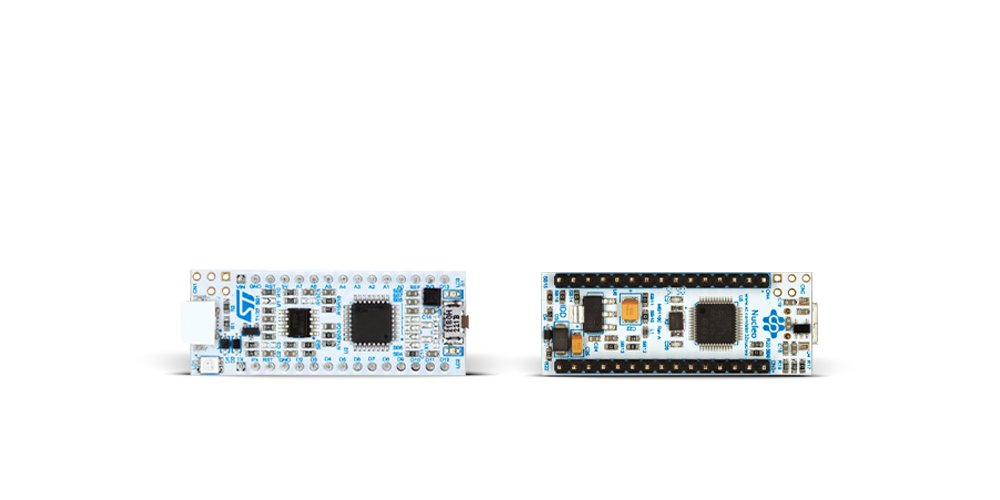
微控制器概述
MCU卡片 / MCU
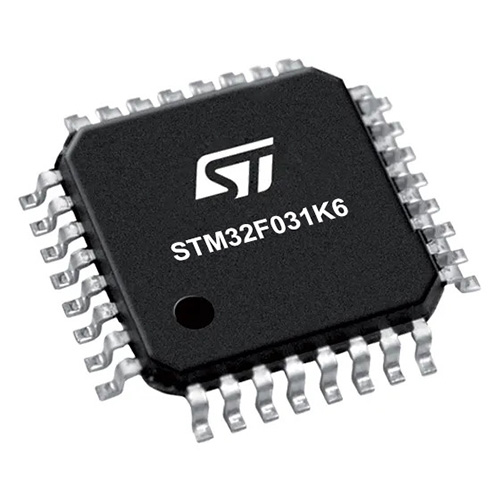
建筑
ARM Cortex-M0
MCU 内存 (KB)
32
硅供应商
STMicroelectronics
引脚数
32
RAM (字节)
4096
你完善了我!
配件
Click Shield for Nucleo-32是扩展您的开发板功能的理想选择,专为STM32 Nucleo-32引脚布局设计。Click Shield for Nucleo-32提供了两个mikroBUS™插座,可以添加来自我们不断增长的Click板™系列中的任何功能。从传感器和WiFi收发器到电机控制和音频放大器,我们应有尽有。Click Shield for Nucleo-32与STM32 Nucleo-32开发板兼容,为用户提供了一种经济且灵活的方式,使用任何STM32微控制器快速创建原型,并尝试各种性能、功耗和功能的组合。STM32 Nucleo-32开发板无需任何独立的探针,因为它集成了ST-LINK/V2-1调试器/编程器,并随附STM32全面的软件HAL库和各种打包的软件示例。这个开发平台为用户提供了一种简便且通用的方式,将STM32 Nucleo-32兼容开发板与他们喜欢的Click板™结合,应用于即将开展的项目中。
使用的MCU引脚
mikroBUS™映射器
“仔细看看!”
Click board™ 原理图

一步一步来
项目组装
软件支持
库描述
该库包含 WiFi NORA Click 驱动程序的 API。
关键功能:
wifinora_hw_reset- 此函数用于执行硬件重置。wifinora_send_cmd- 此函数用于发送所需的命令。wifinora_send_cmd_with_par- 此函数用于发送带参数的所需命令。
开源
代码示例
完整的应用程序代码和一个现成的项目可以通过NECTO Studio包管理器直接安装到NECTO Studio。 应用程序代码也可以在MIKROE的GitHub账户中找到。
/*!
* @file main.c
* @brief WiFi NORA Click Example.
*
* # Description
* This example demonstrates the use of WiFi NORA Click board by processing
* the incoming data and displaying them on the USB UART.
*
* The demo application is composed of two sections :
*
* ## Application Init
* Initializes the driver, tests the communication, and after that restarts the device, and performs example configuration.
*
* ## Application Task
* It creates a connection to the TCP-UDP echo server, sends a message to it reads it back, displaces it on the UART terminal, and then closes the connection.
*
* ## Additional Function
* - static void wifinora_clear_app_buf ( void )
* - static void wifinora_log_app_buf ( void )
* - static err_t wifinora_process ( wifinora_t *ctx )
* - static err_t wifinora_rsp_check ( uint8_t *rsp )
* - static void wifinora_configure_for_example ( void )
* - static void wifinora_configure_for_example ( void )
*
* @author Stefan Ilic
*
*/
#include "board.h"
#include "log.h"
#include "wifinora.h"
// Message content
#define MESSAGE_CONTENT "WiFi NORA Click board - demo example."
// TCP/UDP example parameters
#define REMOTE_IP "77.46.162.162" // TCP/UDP echo server IP address
#define REMOTE_PORT "51111" // TCP/UDP echo server port
// WiFi parameters
#define WIFI_SSID "MikroE Public"
#define WIFI_PWD "mikroe.guest"
// Application buffer size
#define APP_BUFFER_SIZE 200
#define PROCESS_BUFFER_SIZE 200
static wifinora_t wifinora;
static log_t logger;
static err_t error_flag;
static uint8_t app_buf[ APP_BUFFER_SIZE ] = { 0 };
static int32_t app_buf_len = 0;
/**
* @brief WiFi NORA clearing application buffer.
* @details This function clears memory of application buffer and reset its length.
* @note None.
*/
static void wifinora_clear_app_buf ( void );
/**
* @brief WiFi NORA log application buffer.
* @details This function logs data from application buffer to USB UART.
* @note None.
*/
static void wifinora_log_app_buf ( void );
/**
* @brief WiFi NORA data reading function.
* @details This function reads data from device and concatenates data to application buffer.
* @return @li @c 0 - Read some data.
* @li @c -1 - Nothing is read.
* See #err_t definition for detailed explanation.
* @note None.
*/
static err_t wifinora_process ( void );
/**
* @brief Response check.
* @details This function checks for response and
* returns the status of response.
* @param[in] rsp Expected response.
* @return @li @c 0 - OK response.
* @li @c -1 - Error response.
* @li @c -2 - Timeout error.
* @li @c -3 - Unknown error.
* See #err_t definition for detailed explanation.
*/
static err_t wifinora_rsp_check ( uint8_t *rsp );
/**
* @brief Check for errors.
* @details This function checks for different types of
* errors and logs them on UART or logs the response if no errors occured.
* @param[in] error_flag Error flag to check.
*/
static void wifinora_error_check ( err_t error_flag );
/**
* @brief WiFi NORA configure for example function.
* @details This function is used to configure device for example.
*/
static void wifinora_configure_for_example ( void );
/**
* @brief WiFi NORA execute example function.
* @details This function executes TCP/UDP Example.
*/
static void wifinora_example ( void );
void application_init ( void )
{
log_cfg_t log_cfg; /**< Logger config object. */
wifinora_cfg_t wifinora_cfg; /**< Click config object. */
/**
* Logger initialization.
* Default baud rate: 115200
* Default log level: LOG_LEVEL_DEBUG
* @note If USB_UART_RX and USB_UART_TX
* are defined as HAL_PIN_NC, you will
* need to define them manually for log to work.
* See @b LOG_MAP_USB_UART macro definition for detailed explanation.
*/
LOG_MAP_USB_UART( log_cfg );
log_init( &logger, &log_cfg );
log_info( &logger, " Application Init " );
// Click initialization.
wifinora_cfg_setup( &wifinora_cfg );
WIFINORA_MAP_MIKROBUS( wifinora_cfg, MIKROBUS_1 );
if ( UART_ERROR == wifinora_init( &wifinora, &wifinora_cfg ) )
{
log_error( &logger, " Communication init." );
for ( ; ; );
}
wifinora_process( );
wifinora_clear_app_buf( );
// Hardware reset
wifinora_hw_reset( &wifinora );
error_flag = wifinora_rsp_check( WIFINORA_RSP_READY );
wifinora_error_check( error_flag );
// Communication check
wifinora_send_cmd( &wifinora, WIFINORA_CMD_AT );
error_flag = wifinora_rsp_check( WIFINORA_RSP_OK );
wifinora_error_check( error_flag );
// Factory reset
wifinora_send_cmd( &wifinora, WIFINORA_CMD_AT_USYFR );
error_flag = wifinora_rsp_check( WIFINORA_RSP_OK );
wifinora_error_check( error_flag );
// Software reset
wifinora_send_cmd( &wifinora, WIFINORA_CMD_AT_SW_RESET );
error_flag = wifinora_rsp_check( WIFINORA_RSP_READY );
wifinora_error_check( error_flag );
wifinora_send_cmd( &wifinora, WIFINORA_CMD_AT_GMM );
error_flag = wifinora_rsp_check( WIFINORA_RSP_OK );
wifinora_error_check( error_flag );
wifinora_configure_for_example( );
log_info( &logger, " Application Task " );
}
void application_task ( void )
{
wifinora_example( );
}
int main ( void )
{
/* Do not remove this line or clock might not be set correctly. */
#ifdef PREINIT_SUPPORTED
preinit();
#endif
application_init( );
for ( ; ; )
{
application_task( );
}
return 0;
}
static void wifinora_clear_app_buf ( void )
{
memset( app_buf, 0, app_buf_len );
app_buf_len = 0;
}
static void wifinora_log_app_buf ( void )
{
for ( int32_t buf_cnt = 0; buf_cnt < app_buf_len; buf_cnt++ )
{
log_printf( &logger, "%c", app_buf[ buf_cnt ] );
}
}
static err_t wifinora_process ( void )
{
uint8_t rx_buf[ PROCESS_BUFFER_SIZE ] = { 0 };
int32_t overflow_bytes = 0;
int32_t rx_cnt = 0;
int32_t rx_size = wifinora_generic_read( &wifinora, rx_buf, PROCESS_BUFFER_SIZE );
if ( ( rx_size > 0 ) && ( rx_size <= APP_BUFFER_SIZE ) )
{
if ( ( app_buf_len + rx_size ) > APP_BUFFER_SIZE )
{
overflow_bytes = ( app_buf_len + rx_size ) - APP_BUFFER_SIZE;
app_buf_len = APP_BUFFER_SIZE - rx_size;
memmove ( app_buf, &app_buf[ overflow_bytes ], app_buf_len );
memset ( &app_buf[ app_buf_len ], 0, overflow_bytes );
}
for ( rx_cnt = 0; rx_cnt < rx_size; rx_cnt++ )
{
if ( rx_buf[ rx_cnt ] )
{
app_buf[ app_buf_len++ ] = rx_buf[ rx_cnt ];
}
}
return WIFINORA_OK;
}
return WIFINORA_ERROR;
}
static err_t wifinora_rsp_check ( uint8_t *rsp )
{
uint32_t timeout_cnt = 0;
uint32_t timeout = 120000;
wifinora_clear_app_buf( );
wifinora_process( );
while ( ( 0 == strstr( app_buf, rsp ) ) &&
( 0 == strstr( app_buf, WIFINORA_RSP_ERROR ) ) )
{
wifinora_process( );
if ( timeout_cnt++ > timeout )
{
wifinora_clear_app_buf( );
return WIFINORA_ERROR_TIMEOUT;
}
Delay_ms ( 1 );
}
Delay_ms ( 100 );
wifinora_process( );
if ( strstr( app_buf, rsp ) )
{
return WIFINORA_OK;
}
else if ( strstr( app_buf, WIFINORA_RSP_ERROR ) )
{
return WIFINORA_ERROR_CMD;
}
else
{
return WIFINORA_ERROR_UNKNOWN;
}
}
static void wifinora_error_check ( err_t error_flag )
{
switch ( error_flag )
{
case WIFINORA_OK:
{
wifinora_log_app_buf( );
break;
}
case WIFINORA_ERROR:
{
log_error( &logger, " Overflow!" );
break;
}
case WIFINORA_ERROR_TIMEOUT:
{
log_error( &logger, " Timeout!" );
break;
}
case WIFINORA_ERROR_CMD:
{
log_error( &logger, " ERROR Response!" );
break;
}
case WIFINORA_ERROR_UNKNOWN:
default:
{
log_error( &logger, " Unknown!" );
break;
}
}
log_printf( &logger, "- - - - - - - - - - - - - - - -\r\n" );
Delay_ms ( 500 );
}
static void wifinora_configure_for_example ( void )
{
uint8_t command_data[ APP_BUFFER_SIZE ] = { 0 };
#define WLAN_HANDLE "0"
strcpy( command_data, WLAN_HANDLE );
strcat( command_data, ",\"" );
strcat( command_data, WIFI_SSID );
strcat( command_data, "\"" );
wifinora_send_cmd_with_par( &wifinora, WIFINORA_CMD_AT_UWSCP, command_data );
error_flag = wifinora_rsp_check( WIFINORA_RSP_OK );
wifinora_error_check( error_flag );
wifinora_send_cmd_with_par( &wifinora, WIFINORA_CMD_AT_UWSIPD, "0" );
error_flag = wifinora_rsp_check( WIFINORA_RSP_OK );
wifinora_error_check( error_flag );
#define WPA_THRESHILD "0"
strcpy( command_data, WLAN_HANDLE );
strcat( command_data, ",\"" );
strcat( command_data, WIFI_PWD );
strcat( command_data, "\"," );
strcat( command_data, WPA_THRESHILD );
wifinora_send_cmd_with_par( &wifinora, WIFINORA_CMD_AT_UWSSW, command_data );
error_flag = wifinora_rsp_check( WIFINORA_RSP_OK );
wifinora_error_check( error_flag );
wifinora_send_cmd_with_par( &wifinora, WIFINORA_CMD_AT_UWSC, "0" );
error_flag = wifinora_rsp_check( WIFINORA_RSP_OK );
wifinora_error_check( error_flag );
#define CONNECTED "+UENEU"
error_flag = wifinora_rsp_check( CONNECTED );
}
static void wifinora_example ( void )
{
uint8_t command_data[ APP_BUFFER_SIZE ] = { 0 };
#define TCP_CLIENT "0"
#define UDP_CLIENT "1"
#define READ_LEN "255"
log_printf( &logger, " TCP Example \r\n" );
log_printf( &logger, "- - - - - - - - - - - - - - - -\r\n" );
#define TCP_PROTOCOL "6"
wifinora_send_cmd_with_par( &wifinora, WIFINORA_CMD_AT_USOCR, TCP_PROTOCOL );
error_flag = wifinora_rsp_check( WIFINORA_RSP_OK );
wifinora_error_check( error_flag );
strcpy( command_data, TCP_CLIENT );
strcat( command_data, "," );
strcat( command_data, REMOTE_IP );
strcat( command_data, "," );
strcat( command_data, REMOTE_PORT );
wifinora_send_cmd_with_par( &wifinora, WIFINORA_CMD_AT_USOC, command_data );
error_flag = wifinora_rsp_check( WIFINORA_RSP_OK );
wifinora_error_check( error_flag );
log_printf( &logger, " Send data \r\n" );
log_printf( &logger, "- - - - - - - - - - - - - - - -\r\n" );
strcpy( command_data, TCP_CLIENT );
strcat( command_data, ",\"" );
strcat( command_data, MESSAGE_CONTENT );
strcat( command_data, "\"" );
wifinora_send_cmd_with_par( &wifinora, WIFINORA_CMD_AT_USOWS, command_data );
error_flag = wifinora_rsp_check( WIFINORA_RSP_OK );
wifinora_error_check( error_flag );
log_printf( &logger, " Read data \r\n" );
log_printf( &logger, "- - - - - - - - - - - - - - - -\r\n" );
strcpy( command_data, TCP_CLIENT );
strcat( command_data, "," );
strcat( command_data, READ_LEN );
wifinora_send_cmd_with_par( &wifinora, WIFINORA_CMD_AT_USORS, command_data );
error_flag = wifinora_rsp_check( WIFINORA_RSP_OK );
wifinora_error_check( error_flag );
// 10 seconds delay
Delay_ms ( 1000 );
Delay_ms ( 1000 );
Delay_ms ( 1000 );
Delay_ms ( 1000 );
Delay_ms ( 1000 );
Delay_ms ( 1000 );
Delay_ms ( 1000 );
Delay_ms ( 1000 );
Delay_ms ( 1000 );
Delay_ms ( 1000 );
log_printf( &logger, " UDP Example \r\n" );
log_printf( &logger, "- - - - - - - - - - - - - - - -\r\n" );
#define UDP_PROTOCOL "17"
wifinora_send_cmd_with_par( &wifinora, WIFINORA_CMD_AT_USOCR, UDP_PROTOCOL );
error_flag = wifinora_rsp_check( WIFINORA_RSP_OK );
wifinora_error_check( error_flag );
strcpy( command_data, UDP_CLIENT );
strcat( command_data, "," );
strcat( command_data, REMOTE_IP );
strcat( command_data, "," );
strcat( command_data, REMOTE_PORT );
wifinora_send_cmd_with_par( &wifinora, WIFINORA_CMD_AT_USOC, command_data );
error_flag = wifinora_rsp_check( WIFINORA_RSP_OK );
wifinora_error_check( error_flag );
log_printf( &logger, " Send data \r\n" );
log_printf( &logger, "- - - - - - - - - - - - - - - -\r\n" );
strcpy( command_data, UDP_CLIENT );
strcat( command_data, ",\"" );
strcat( command_data, MESSAGE_CONTENT );
strcat( command_data, "\"" );
wifinora_send_cmd_with_par( &wifinora, WIFINORA_CMD_AT_USOWS, command_data );
error_flag = wifinora_rsp_check( WIFINORA_RSP_OK );
wifinora_error_check( error_flag );
log_printf( &logger, " Read data \r\n" );
log_printf( &logger, "- - - - - - - - - - - - - - - -\r\n" );
strcpy( command_data, UDP_CLIENT );
strcat( command_data, "," );
strcat( command_data, READ_LEN );
wifinora_send_cmd_with_par( &wifinora, WIFINORA_CMD_AT_USORS, command_data );
error_flag = wifinora_rsp_check( WIFINORA_RSP_OK );
wifinora_error_check( error_flag );
log_printf( &logger, " Close sockets \r\n" );
log_printf( &logger, "- - - - - - - - - - - - - - - -\r\n" );
wifinora_send_cmd_with_par( &wifinora, WIFINORA_CMD_AT_USOCL, UDP_CLIENT );
error_flag = wifinora_rsp_check( WIFINORA_RSP_OK );
wifinora_error_check( error_flag );
wifinora_send_cmd_with_par( &wifinora, WIFINORA_CMD_AT_USOCL, TCP_CLIENT );
error_flag = wifinora_rsp_check( WIFINORA_RSP_OK );
wifinora_error_check( error_flag );
// 10 seconds delay
Delay_ms ( 1000 );
Delay_ms ( 1000 );
Delay_ms ( 1000 );
Delay_ms ( 1000 );
Delay_ms ( 1000 );
Delay_ms ( 1000 );
Delay_ms ( 1000 );
Delay_ms ( 1000 );
Delay_ms ( 1000 );
Delay_ms ( 1000 );
}
// ------------------------------------------------------------------------ END
额外支持
资源
类别:无线网络













